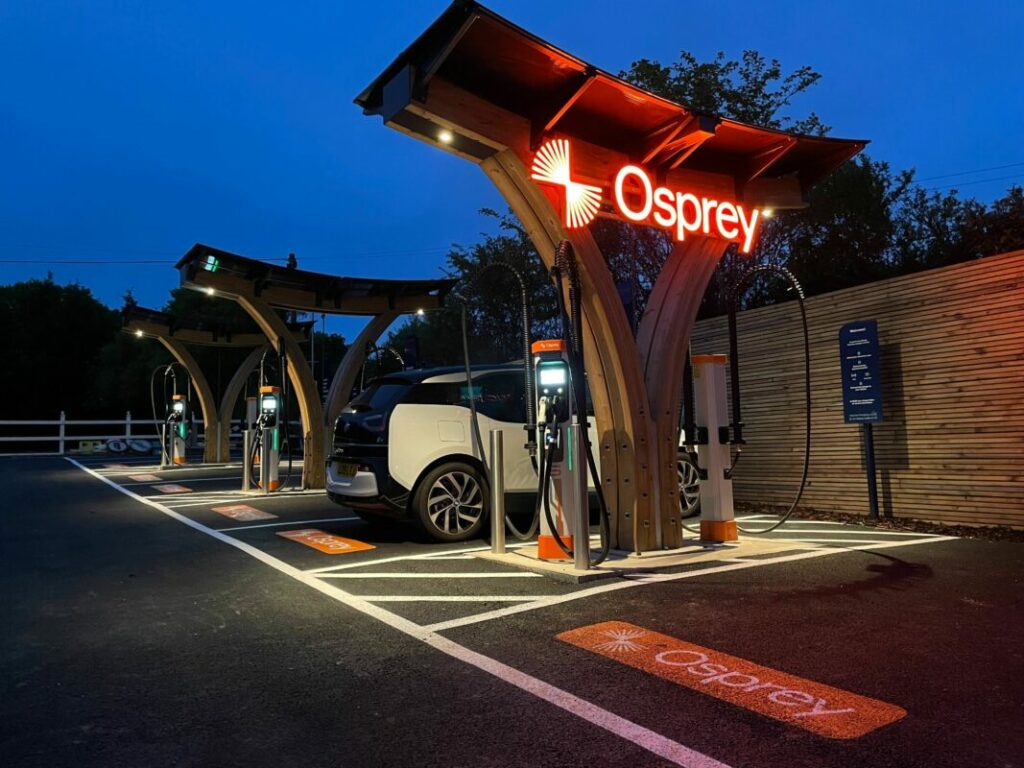Current± rounds up the top electric vehicle (EV) stories from this week.
Wiltshre Council installs new EV chargepoints
Wiltshire Council has announced the installation of 26 new Electric Vehicle (EV) chargepoints as part of an ongoing county-wide installation programme.
The Council said more chargepoints were to come, as it works with Joju Charging to roll out the new charge points which are replacing existing BP Pulse chargers in car parks and council hubs.
The programme will bring the number of chargepoints in the county up to 70, with charging power ranging from 7kW to 44kW rapid chargers, with some 22kW fast chargers as well.
Using the chargers “will cost 52p per kWh from Monday 22 May”, according to the Council, and they will be accessible through the Mer app.
We've installed 26 new electric vehicle (EV) charging points in the county, with more to come as part of our county-wide installation programme.
— Wiltshire Council #WiltshireTogether (@wiltscouncil) May 15, 2023
Full details 👉🏽 https://t.co/rcTWtAv1mu pic.twitter.com/s5pdz15xdd
“As well as these chargers, we are also offering a grant to town and parish councils to enable them to install EV chargers at suitable locations, and we have also invested in 45 new fully electric fleet vehicles and 17 plug-in hybrid vans, with more to come,” said councillor Caroline Thomas, Cabinet Member for Transport.
In January 2023, GRIDSERVE announced it had opened a High Power Electric Super Hub near Stonehenge at Solstice Park, Wiltshire.
Osprey Charging opens rapid charging hub near M25 in Essex
A new charging hub with six high-powered chargers has been opened by Osprey Charging less than five minutes from the M25 on the A127.
The hub, located at the Halfway House restaurant next to East Horndon Travelodge, features load-blalancing technology to maximise the amount of charge each vehicle receives when multiple electric vehicles (EVs) are plugged in.
The rapid chargers are capable of up to 180kW and are compatible with every EV on the market. The chargers will be able to add around 100 miles of charge in 15-20 minutes.
Osprey says the hub is optimised for safety and accessibility, and has “the UK’s highest ChargeSafe inspection score to date (4.79), for its extra space, ease of use and canopies providing shelter and lighting.”
Another ultra-rapid charging hub has launched at Halfway House, Essex CM13 3LL! This hub features 6x180kW load-balancing chargers within a layout that maximises space for all drivers. Canopies (which are due to be widened) provide overhead lighting and shelter for a safe and… pic.twitter.com/tk2L59GbiQ
— Osprey Charging (@OspreyCharging) May 16, 2023
Ian Johnston, chief executive of Osprey Charging, said: “Our new ultra-rapid charging hub in Essex is a major addition to the UK’s EV charging infrastructure at an important location for locals, commuters and through traffic, right next to the M25.
“We are always looking at how we can make the charging experience better for our customers, and the use of load balancing technology at this site means more drivers are able to charge their vehicle faster, with no power wasted.”
Osprey recently announced it had installed as many chargers as it did throughout 2022 in Q1 2023, with 142 new charging stations going live.
Zest wins TfL tender to provide 39 rapid charging points on public roads
Transport for London (TfL) has awarded Zest a contract to provide and operate 39 new rapid or ultra-rapid Electric Vehicle (EV) charging stations on public land on strategic roads in South London.
TfL said the locations had been selected “to allow more essential and high mileage road users – such as commercial vehicles – to make the switch to zero emission”.
The new charge points will be rolled out by autumn 2024 across South London, with 60 more charging points across other parts of London to follow. London’s EV charging network now has close to 13,000 points, he most in any European city.
🎉@TfL has awarded Zest a contract to roll out 39 new electric vehicle charging bays across 24 locations in south and southwest London by the end of 2024!
— Zest (@ZestCharging) May 10, 2023
Read more here: https://t.co/gkYboFBEWg
#evcharginginfrastructure #London #publicsector
The UK government recently published figures showing that the number of EV charge points had increased by 8% in Q1 2023, with a total of 40,150 across the country.
The new charge points are part of TfL’s Infrastructure Delivery Programme, which aims to unlock owned by TfL and other members of the Greater London Authority like the London Fire Brigade and Metropolitan Police.
TfL said there were already 103,000 EVs registered in the capital, and 31% of all EV charging infrastructure across the UK is in the capital. “London is on track to meet the target of 40,000-60,000 charging points by 2030,” TfL said.
Robin Heap, chief executive of Zest, said: “The UK needs an injection of serious infrastructure to meet its net zero goals, and it is farsighted public sector organisations who are taking the lead. Placing rapid and ultra-rapid charging points directly onto London’s high-volume arterial roads will make it easier for drivers to choose electric and improve the air quality for local communities.”






